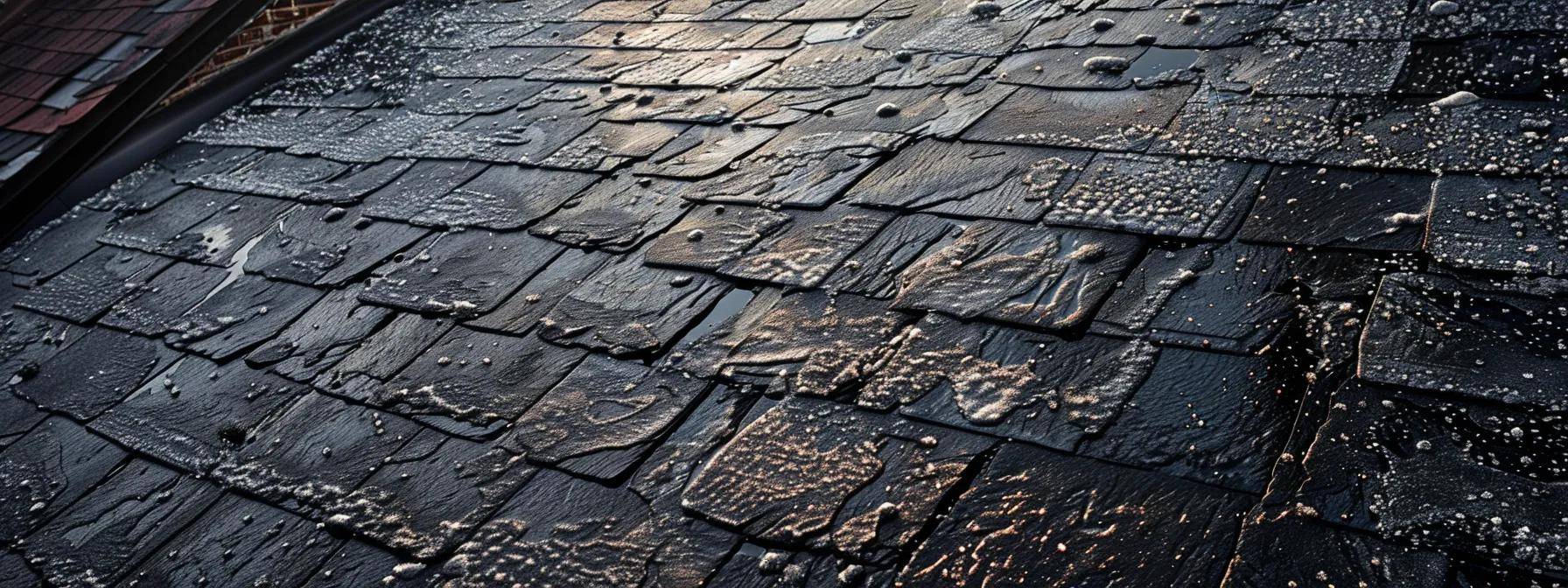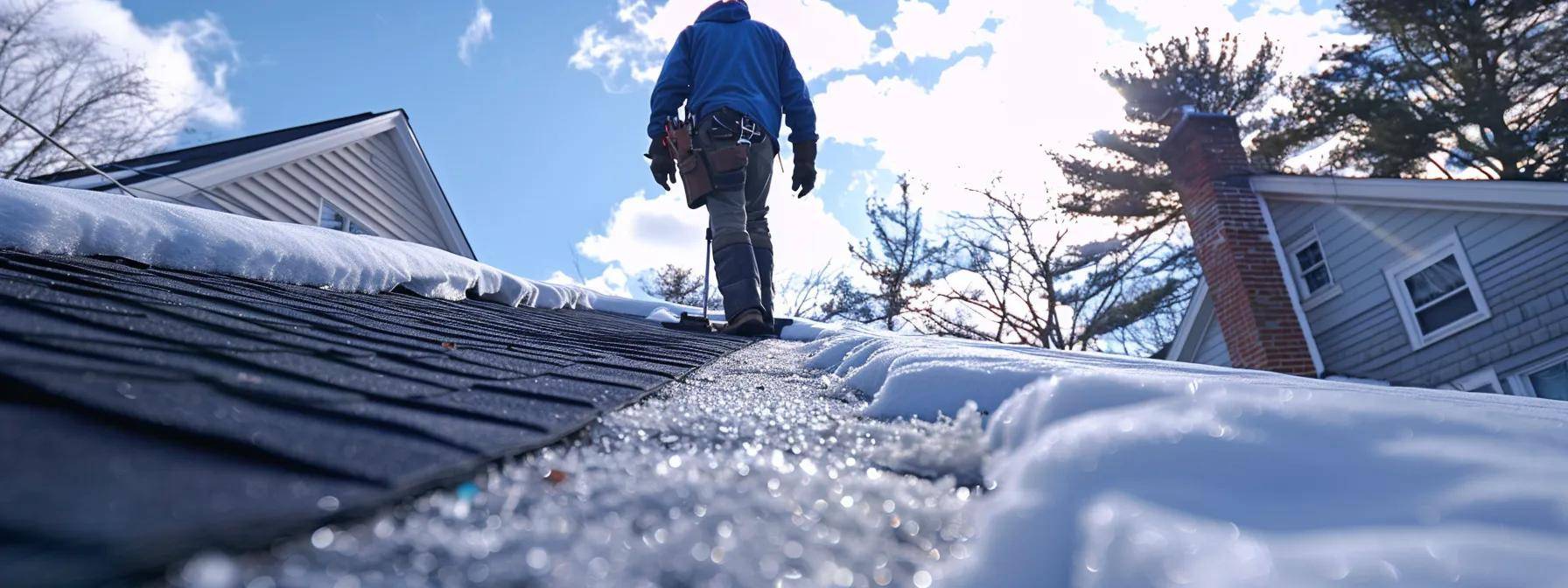None
— Start of Revised Article Output —
Content is Condensed for Target Length
How Weather Affects Roofing in Massachusetts: Expert Contractor Insights for Homeowners and Businesses
Introduction Massachusetts homeowners and business operators face unique challenges in maintaining a quality roof. The state’s weather—from heavy snowfall and ice accumulation in winter to intense wind and high humidity during other seasons—requires careful material selection and regular maintenance. DD Construction (ddconstructionma.com), a trusted name in home improvements, brings expert workmanship and quality materials to address these challenges. This article details the impacts of severe weather on Massachusetts roofing systems, identifies the most durable materials for various conditions, outlines recommended maintenance and repair practices, highlights signs of weather-related damage, explains seasonal roofing needs, and underscores the benefits of hiring a local contractor with proven expertise.
Term:
The problem for many Massachusetts property owners is protecting their roof from unpredictable weather in a cost-effective, durable manner. Poor maintenance or substandard materials can lead to costly repairs or even full roof replacement. Homeowners need clear, actionable insights into how snow, ice, wind, storms, rain, and humidity affect roof durability and structure, along with viable solutions and long-lasting materials.
The purpose of this article is to provide comprehensive, expert insights into how weather influences roofing performance in Massachusetts. By analyzing various weather challenges and recommending best practices along with suitable roofing materials, readers can make informed decisions regarding roof maintenance and improvements. The content draws on recent data, industry standards, and proven experiences from local roofing contractors who understand Massachusetts’s environmental specifics. Readers will gain a clear understanding of the long-term impacts of adverse weather and how preventive measures can save time and money.
This article is structured into several key sections. First, it outlines the primary weather challenges in Massachusetts. Next, it details which roofing materials perform best under these conditions and how contractors can mitigate weather damage through proper maintenance and timely repairs. It then explores clear indicators of weather-related damage for homeowners, followed by an analysis of how seasonal changes affect roofing needs. Finally, the article examines the many benefits of hiring a local Massachusetts roof contractor who understands the region’s unique climate.
What Are the Key Weather Challenges for Roofing in Massachusetts?
Roofing systems in Massachusetts face a myriad of weather conditions that demand diligent maintenance and careful material selection. Homeowners must understand how heavy snowfall, ice formation, soaring winds, and relentless rain contribute to roof deterioration. These factors can lower the lifespan of roofing materials and increase energy consumption due to compromised insulation and potential structural damage.
The constant freeze–thaw cycle in Massachusetts promotes the cracking and dislodging of shingles or tiles over time. In addition, high humidity and frequent rain foster mold and rot, weakening roof integrity. The following sub-sections explain how specific weather conditions impact roof durability and structure, along with recommended solutions.

How Does Snow Impact Roof Durability and Structure?
Snow, while not harmful on its own, can impose significant stress on a roof when it accumulates. The static pressure from layered snow may cause sagging and deformation of roofing underlayment, or even structural failure in extreme cases. When temperatures fluctuate, melting snow can refreeze along roof edges, leading to ice dam formation. Ice dams block proper water runoff, allowing water to seep under shingles and damage the roof deck and insulation. Experts recommend a robust maintenance schedule during winter—including the use of heated cables and higher gauge metal flashing—to reduce snow buildup and mitigate ice dam risks.
What Risks Does Ice Pose to Massachusetts Roofs?
Ice compounds the problems of heavy snow. The formation of ice dams and the subsequent intrusion of water beneath roofing materials poses severe risks. As water freezes and expands, it can fracture the roofing surface and put tension on seams of underlayment and felt. Over time, repeated freeze–thaw cycles accelerate deterioration and lead to leaks. Homeowners should schedule periodic roof inspections in winter and consider preventative measures such as enhanced attic insulation and ventilation to reduce ice dam formation.
How Do Wind and Storms Affect Roofing Systems?
High winds, particularly during autumn and winter, can lift or detach shingles from a roof, creating vulnerabilities for water infiltration. Storm surges expose roofs to rapid pressure changes, causing shingles to loosen or go missing. Although severe storms and hurricanes are less frequent in Massachusetts, hail and debris from storms can physically impact roofing surfaces, puncturing or fracturing shingles. Roofing contractors advise using impact-resistant materials and conducting routine post-storm assessments to swiftly repair any damage before it worsens.
In What Ways Do Rain and Humidity Influence Roof Maintenance?
Persistent rain exposes roofs to prolonged moisture, which can seep into lapses in sealants and promote mold, wood rot, and insulation decay. High humidity increases corrosion risk for metal components like flashing and gutters and can compromise the adhesive quality of roofing membranes. Regular inspections and prompt repairs—such as cleaning gutters and applying weather-resistant coatings—are critical to maintaining roof performance and durability.
Which Roofing Materials Best Withstand Massachusetts Weather Conditions?
Choosing the right roofing material in Massachusetts is crucial given the state’s diverse and harsh weather. A roof’s durability depends on both the quality of installation and the intrinsic properties of the materials used. Each option—from asphalt shingles to metal roofs—offers unique benefits for handling snow, ice, wind, and rain.
When selecting roofing materials, factors such as weight, thermal expansion, impact resistance, and water runoff efficiency are vital. Homeowners should opt for well-established materials with proven performance in similar climates. DD Construction emphasizes collaborating with experienced contractors who can recommend the best solutions according to local weather patterns and building codes.
Are Asphalt Shingles Suitable for Harsh Winters?
Asphalt shingles have long been popular for their cost-effectiveness and ease of installation. However, their performance under heavy snow and repeated freeze–thaw cycles can be a concern. Modern asphalt shingles, reinforced with improved adhesives, offer better resistance to ice dam damage and wind uplift, though their longevity may be limited in areas with extreme temperature fluctuations. Homeowners may consider investing in proper underlayment and ice barriers or opting for more robust alternatives if long-term durability is desired.
How Does Metal Roofing Perform Against Snow and Ice?
Metal roofing is increasingly popular in Massachusetts because it handles extreme weather exceptionally well. Its smooth surface allows snow to slide off easily, reducing weight load, and its low thermal mass minimizes ice accumulation. Furthermore, metal roofs are durable against wind and storm damage due to their inherent flexibility. They are also fire-resistant and less prone to mold or algae growth in high humidity. Homeowners investing in metal roofing benefit from a longer lifespan and lower maintenance, often achieving a higher return on investment.
What Are the Benefits of Tile and Other Roofing Systems in This Climate?
Tile roofing systems, whether clay or concrete, offer both aesthetic appeal and durability. These materials can withstand heavy snow and ice while allowing for thermal expansion without significant damage. Their excellent water-shedding properties and natural ventilation also contribute to energy efficiency and indoor comfort. Other systems, such as slate, are renowned for exceptional longevity and low maintenance despite higher upfront costs. Homeowners must weigh aesthetics, cost, and projected lifespan when choosing among these high-end options.
How Can Roof Contractors in Massachusetts Protect Roofs From Weather Damage?
Experienced roof contractors in Massachusetts are essential in safeguarding roofs against harsh weather. They employ preventative maintenance, timely repairs, and full roof replacements when necessary to ensure roofs remain airtight and water-resistant. Contractors typically inspect roofs before and after severe weather events, offering both short- and long-term solutions tailored to each property.
Expert roofers not only address visible damages but also repair underlying issues through practices like reapplying sealants, installing underlayment barriers, and reinforcing roof attachments. Local contractors, drawing on many years of experience, understand that proactive measures can prevent extensive damage and save homeowners costly repairs. They also offer consultations on material upgrades and seasonal maintenance plans with inspections scheduled before winter and after major storms.

What Preventative Maintenance Practices Are Recommended?
Preventative maintenance is vital for extending roof life in Massachusetts. Contractors recommend regular gutter cleaning, removal of snow and debris to reduce weight and ice dam risk, and thorough inspections to catch early signs of wear. Additionally, annually applying specialized sealants or protective coatings can bolster a roof’s resistance to water and ultraviolet damage. For metal roofs, periodic checks for corrosion and proper fastening are advised. Many contractors suggest biannual roof inspections in spring and fall, particularly after severe weather events.
When Is Roof Repair Necessary After Severe Weather?
Roof repair becomes imperative when severe weather compromises the roof’s integrity. Signs include missing or cracked shingles, loose flashing around chimneys and skylights, and water stains on interior ceilings. After a significant storm, an immediate inspection is essential to assess damage and initiate repairs before leaks cause further deterioration. Timely interventions prevent issues like mold growth, wood rot, and structural damage that can escalate repair costs and compromise energy efficiency.
How Does Roof Replacement Address Weather-Related Wear?
While localized repairs can fix specific issues, roof replacement is the definitive solution when weather-related wear is widespread. Over time, factors such as freeze–thaw cycles, persistent moisture, and wind damage can erode even the best roofing systems. A complete replacement not only addresses current deficiencies but also reinforces the home against future weather impacts. Modern roofs feature improved underlayments, advanced sealants, and stronger fastenings, enhancing insulation and potentially lowering energy bills. New installations also benefit from updated building codes and warranty protections.
What Are the Signs of Weather-Related Roof Damage Homeowners Should Watch For?
Recognizing early signs of weather-related roof damage is critical for Massachusetts property owners. Early detection allows for timely intervention, preventing minor issues from escalating into costly repairs. Indicators include visible defects such as missing shingles, water stains, sagging roof edges, blistered or buckled shingles, and gaps around fixtures like vents and chimneys. Regular visual inspections following harsh weather events can help catch these issues before extensive damage occurs.
How to Detect Snow and Ice Damage Early?
Homeowners can detect snow and ice damage by closely monitoring their roof after heavy winter storms. Look for ice dams along the eaves, cracked or warped shingles, white streaks from melting ice, and raised shingle edges. A safe inspection via binoculars or a professional aerial assessment is recommended if climbing the roof is not feasible. Additionally, checking attics for moisture marks, mildew, or wood rot can indicate insulation issues caused by ice damage.
What Are Common Wind and Rain Damage Indicators?
Wind and rain leave distinct damage marks that are usually noticeable. Loose or missing shingles, curled edges, and damaged gutters or downspouts from wind-driven debris are common. Rain damage can be identified by water stains near interior ceilings. Additionally, accelerated granule loss from asphalt shingles signals the onset of deterioration. A thorough inspection of roof fixtures and flashing can help catch these issues early before they lead to significant interior or structural damage.
When Should You Contact a Massachusetts Roof Contractor?
It is vital to contact a qualified Massachusetts roof contractor as soon as any signs of weather-related damage appear. Minor issues like isolated missing shingles, small ice dams, or water stains deserve a professional evaluation to prevent further spread. After severe weather events, immediate inspections are recommended. If recurring problems are observed despite regular maintenance, it may indicate that the roof’s protective life is ending, and extensive repairs or a full replacement might be necessary.
How Do Seasonal Weather Changes Affect Roofing Needs in Massachusetts?
Seasonal weather variations in Massachusetts significantly influence roofing maintenance. Each season—winter, spring, summer, and fall—brings unique challenges that necessitate a tailored approach. Winter’s heavy snow and ice require the roof to shed weight efficiently, while spring focuses on repairing winter damage and addressing moisture-related issues. During summer and fall, high temperatures cause roofing materials to expand and contract, potentially leading to cracks or fastener loosening. Proactive maintenance throughout the seasons helps prevent long-term deterioration and costly repairs.

What Roofing Preparations Are Needed for Winter?
Before winter, a thorough inspection is crucial. Contractors recommend reinforcing the roof structure, cleaning gutters, and removing debris to prevent water retention. Ensuring that insulation is adequate and ventilation is optimal can also help prevent ice dam formation by maintaining a consistent attic temperature. Installing heated cables, reapplying weather-resistant sealants, and repairing any loose shingles are effective measures to prepare a roof for winter.
How Does Spring Weather Impact Roof Maintenance?
Spring brings relief from winter, but also reveals damage such as shingle granule loss, small leaks, and mold onset. Homeowners should schedule comprehensive inspections early in the season to address any winter-related issues. Cleaning the roof to remove moss, algae, and debris not only restores appearance but also improves water shedding. Reviewing and repairing flashings and seals around roof penetrations is also important to withstand the rainy season.
What Are Summer and Fall Roofing Considerations?
In summer, high temperatures and UV exposure can degrade sealants and accelerate material expansion and contraction. Homeowners should keep the roof free of debris and ensure proper ventilation to mitigate heat buildup. As fall arrives, it is important to prepare for heavy rains and high winds. Fall inspections should focus on debris removal, gutter maintenance, and repairing any damage from summer storms to secure the roof’s performance during the upcoming winter.
Why Choose a Local Massachusetts Roof Contractor for Weather-Related Roofing Issues?
Local Massachusetts roof contractors bring significant advantages when addressing weather-related challenges. Their firsthand knowledge of local climate patterns and building codes ensures that each roofing project is executed with an expert understanding of durability and resilience. Familiar with the history of local weather impacts, these contractors use specialized techniques to protect roofs from snow, ice, wind, and rain.
Working with a local contractor offers prompt service, faster emergency response, and personalized consultations. In addition to technical expertise, they provide cost-effective maintenance plans and warranties to secure your investment. DD Construction, for example, is known for delivering high-quality roofing solutions tailored to Massachusetts’s unique climate, ensuring both immediate repair and long-term performance.
How Does Local Weather Expertise Benefit Your Roof?
Local contractors understand the specific types of storms, snow accumulation, and freeze–thaw cycles common in Massachusetts. This enables them to recommend and install roofing systems optimized for local conditions using materials and techniques tested for regional challenges. Their quick response to emergencies and thorough maintenance checks, combined with familiarity with local codes, result in superior durability and warranty management, leading to higher customer satisfaction.
What Makes Massachusetts Contractors Different in Quality and Service?
Massachusetts contractors stand out for their commitment to quality, local expertise, and customer-focused service. With decades of experience under harsh weather conditions, they deliver superior craftsmanship and tailored solutions. They use advanced materials and installation techniques to address challenges like heavy snow, ice, high winds, and fluctuating humidity. Their comprehensive service plans, which include free quotes and detailed maintenance schedules, ensure adherence to local building codes and prompt emergency consultations, setting them apart in the competitive roofing market.
How Do Contractors Educate Homeowners About Weather Effects?
Effective communication is key to mitigating weather-related roofing risks. Local contractors educate homeowners on signs of impending damage, preventive maintenance best practices, and the benefits of timely repairs or replacement. They provide detailed inspection reports with photographic evidence and clear explanations of weather impacts on roof integrity. Additionally, they offer educational workshops, free quotes including danger assessments, and digital tools that share seasonal maintenance checklists—empowering homeowners to make informed decisions and achieve long-term savings.
What Are the Costs and Benefits of Weather-Resistant Roofing Solutions in Massachusetts?
Investing in weather-resistant roofing solutions in Massachusetts involves balancing higher initial costs with long-term benefits such as durability, reduced maintenance, and enhanced home protection. Premium roofs built to withstand harsh weather provide improved energy efficiency, lower repair frequencies, and increased property value over time. Homeowners should view these solutions as strategic, long-term investments in safety and sustainability. DD Construction offers competitive financing and comprehensive maintenance packages designed to keep weather-resistant roofs robust through decades of severe weather.

How Does Investing in Quality Materials Save Money Long-Term?
High-quality, weather-resistant materials reduce the need for frequent repairs or replacements, lowering ongoing maintenance costs. For instance, impact-resistant metal roofing or premium shingles designed for extreme freeze–thaw cycles can significantly extend a roof’s lifespan. Additionally, modern roofing systems that incorporate energy-efficient insulation help lower heating costs in winter. Extended warranties and improved resale value further offset the higher initial costs.
What Financing or Maintenance Plans Do Contractors Offer?
Many Massachusetts roofing contractors offer flexible financing options that allow homeowners to spread the cost of new roofs or major repairs over time. Comprehensive maintenance plans—featuring regular inspections, scheduled cleanings, and preventive repairs—ensure that roofs remain resilient year-round. Benefits often include free annual inspections, priority emergency service, and discounts on repairs, providing both peace of mind and predictable long-term expenses.
Are Weather-Resistant Roofs Worth the Initial Investment?
Weather-resistant roofs, despite a higher upfront cost, offer significant benefits in reduced repair frequency, enhanced energy efficiency, and superior protection against Massachusetts weather. Homeowners enjoy peace of mind knowing their property is safeguarded against leaks, structural damage, and other weather impacts. Over time, the savings on repairs and energy bills typically outweigh the initial expenditure, while enhancing overall market value and aesthetic appeal.
Frequently Asked Questions
Q: How can I tell if my roof has weather-related damage? A: Look for signs such as missing or cracked shingles, water stains on ceilings, or sagging areas. Check for granule loss on asphalt shingles, corrosion on metal components, and ice dam formation in winter. If any of these are observed, a professional inspection is recommended.
Q: What is the best roofing material for Massachusetts climates? A: It depends on your needs and budget. Metal roofs and premium asphalt shingles perform well against snow, ice, and high winds. Tile and slate are also excellent choices for durability and longevity, although they may have a higher upfront cost.
Q: When should I schedule a roof inspection in Massachusetts? A: Schedule inspections at least twice a year—once in the spring to assess winter damage and once in the fall before winter. After heavy storms or prolonged snow events, it is wise to have an immediate inspection.
Q: Will investing in weather-resistant roofing really save me money in the long run? A: Yes. Although the initial investment is higher, these systems reduce repair frequency, lower energy consumption through improved insulation, and increase the property’s resale value, making them economically sound in the long term.
Q: How do local contractors handle emergency repairs during severe weather? A: Local Massachusetts roof contractors offer emergency repair services that include prompt inspections, quick issue identification, and immediate repairs. Many also provide maintenance plans with priority service to address any severe weather damage swiftly.
Q: Can I finance a new roof installation through my contractor? A: Many contractors, including those at DD Construction, offer flexible financing options that allow homeowners to spread out the cost of new roof installations or major repairs over time.
Q: Are roof warranties affected by extreme weather conditions? A: Warranty terms vary by material and installer. High-quality materials installed by experienced local contractors often include warranties that account for extreme weather. It is important to review warranty details and adhere to maintenance guidelines to maintain warranty coverage. — End of Revised Article Output —





